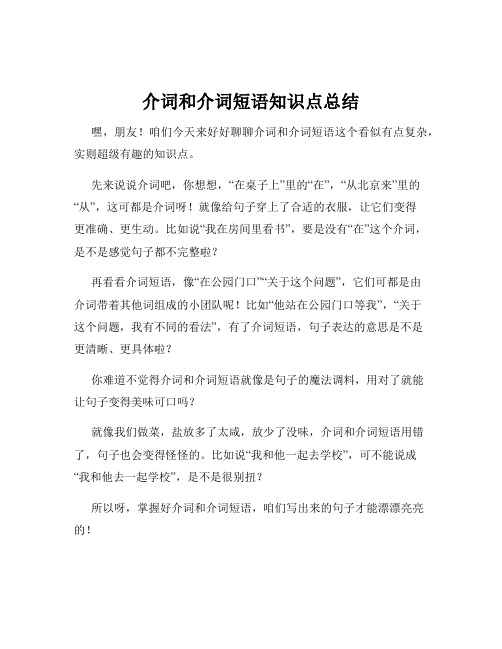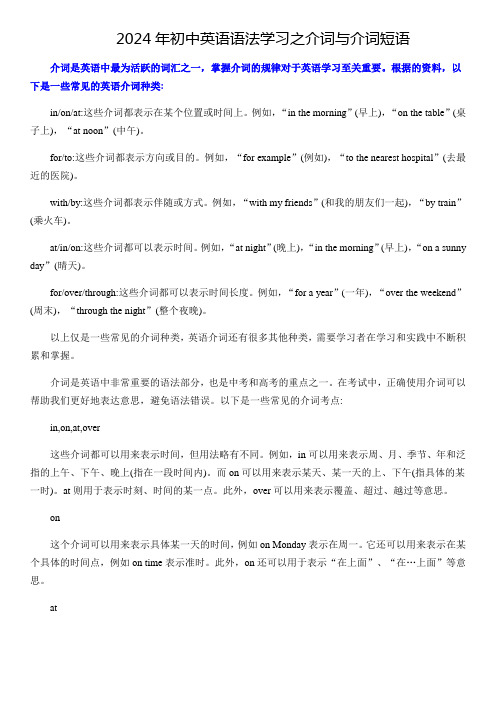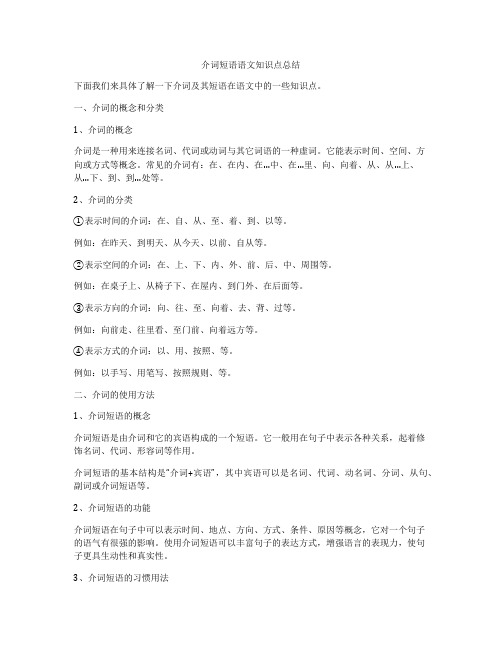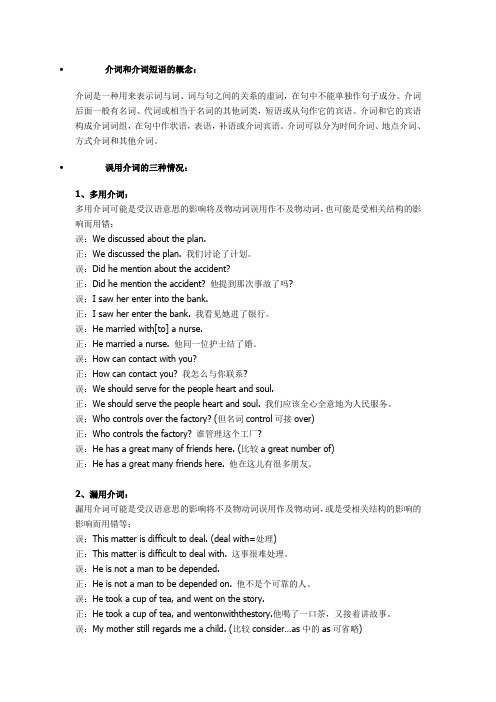最新常用介词短语总结上课讲义
介词和介词短语知识点总结

介词和介词短语知识点总结
嘿,朋友!咱们今天来好好聊聊介词和介词短语这个看似有点复杂,实则超级有趣的知识点。
先来说说介词吧,你想想,“在桌子上”里的“在”,“从北京来”里的“从”,这可都是介词呀!就像给句子穿上了合适的衣服,让它们变得
更准确、更生动。
比如说“我在房间里看书”,要是没有“在”这个介词,是不是感觉句子都不完整啦?
再看看介词短语,像“在公园门口”“关于这个问题”,它们可都是由
介词带着其他词组成的小团队呢!比如“他站在公园门口等我”,“关于
这个问题,我有不同的看法”,有了介词短语,句子表达的意思是不是
更清晰、更具体啦?
你难道不觉得介词和介词短语就像是句子的魔法调料,用对了就能
让句子变得美味可口吗?
就像我们做菜,盐放多了太咸,放少了没味,介词和介词短语用错了,句子也会变得怪怪的。
比如说“我和他一起去学校”,可不能说成“我和他去一起学校”,是不是很别扭?
所以呀,掌握好介词和介词短语,咱们写出来的句子才能漂漂亮亮的!
我的观点是:介词和介词短语虽然有点小复杂,但只要咱们多留意、多练习,就能轻松驾驭它们,让我们的语言变得更精彩!。
介词讲义

介词介词:介词是一种用来表示词与词,词与句之间的关系的词。
介词在句子中不能独立使用,它的后面一般有名词、代词(宾格)或相当于名词的其他词、短语来作宾语,构成介词短语。
1.方位介词(表示所处位置和地点的介词)2). 词义辨析in, outside, between①in: 在…..之内,用于表示静止的位置There are four girls in the room. 房间里有4个女孩。
②outside: 指“在……外面”There are many people outside the room. 房间外面有很多人。
③between:在两者之间There is a hospital between the hotel and the post office. 在宾馆和邮局之间有一所医院。
The building stands between the park and the river. 那栋建筑位于公园和小河之间。
④among: 在三者或者更多的之中There are some American students among us. 在我们中间有几个美国学生。
on, above, over, below, under①on: 在……上面,有接触面on the table 在桌子上面There is a flag on the top of the hill. 山顶上有一面旗帜。
②above: 指表示“在……上方或位置高出……”, 与below (在……下方)互为反义词。
A plane flew above our heads. 一架飞机从我们头上飞过。
The Greens live above us. 格林一家住在我们楼上。
③over: 在……正上方,是under的反义词There is a bridge over the river. 河上有一座桥。
The flag is over the blackboard. 那面旗帜在黑板的正上方。
初中英语语法学习之介词与介词短语讲义

2024年初中英语语法学习之介词与介词短语介词是英语中最为活跃的词汇之一,掌握介词的规律对于英语学习至关重要。
根据的资料,以下是一些常见的英语介词种类:in/on/at:这些介词都表示在某个位置或时间上。
例如,“in the morning”(早上),“on the table”(桌子上),“at noon”(中午)。
for/to:这些介词都表示方向或目的。
例如,“for example”(例如),“to the nearest hospital”(去最近的医院)。
with/by:这些介词都表示伴随或方式。
例如,“with my friends”(和我的朋友们一起),“by train”(乘火车)。
at/in/on:这些介词都可以表示时间。
例如,“at night”(晚上),“in the morning”(早上),“on a sunny day”(晴天)。
for/over/through:这些介词都可以表示时间长度。
例如,“for a year”(一年),“over the weekend”(周末),“through the night”(整个夜晚)。
以上仅是一些常见的介词种类,英语介词还有很多其他种类,需要学习者在学习和实践中不断积累和掌握。
介词是英语中非常重要的语法部分,也是中考和高考的重点之一。
在考试中,正确使用介词可以帮助我们更好地表达意思,避免语法错误。
以下是一些常见的介词考点:in,on,at,over这些介词都可以用来表示时间,但用法略有不同。
例如,in可以用来表示周、月、季节、年和泛指的上午、下午、晚上(指在一段时间内)。
而on可以用来表示某天、某一天的上、下午(指具体的某一时)。
at则用于表示时刻、时间的某一点。
此外,over可以用来表示覆盖、超过、越过等意思。
on这个介词可以用来表示具体某一天的时间,例如on Monday表示在周一。
它还可以用来表示在某个具体的时间点,例如on time表示准时。
介词in,on.at,for.with,by,of的基本用法上课讲义

介词用法知多少介词是英语中最活跃的词类之一。
同一个汉语词汇在英语中可译成不同的英语介词。
例如汉语中的“用”可译成:(1)用英语(in English);(2)用小刀(with a knife);(3)用手工(by hand);(4)用墨水(in ink)等。
所以,千万不要以为记住介词的一两种意思就掌握了这个介词的用法,其实介词的用法非常广泛,搭配能力很强,越是常用的介词,其含义越多。
下面就简单介绍几组近义介词的用法及其搭配方法。
一. in, to, on和off在方位名词前的区别1. in表示A地在B地范围之内。
如:Taiwan is in the southeast of China.2. to表示A地在B地范围之外,即二者之间有距离间隔。
如:Japan lies to the east of China.3. on表示A地与B地接壤、毗邻。
如:North Korea is on the east of China.4. off表示“离……一些距离或离……不远的海上”。
如:They arrived at a house off the main road.New Zealand lies off the eastern coast of Australia.二. at, in, on, by和through在表示时间上的区别1. at指时间表示:(1)时间的一点、时刻等。
如:They came home at sunrise (at noon, at midnight, at ten o’clock, at daybreak, at dawn). (2)较短暂的一段时间。
可指某个节日或被认为是一年中标志大事的日子。
如:He went home at Christmas (at New Year, at the Spring Festival, at night).2. in指时间表示:(1)在某个较长的时间(如世纪、朝代、年、月、季节以及泛指的上午、下午或傍晚等)内。
介词短语语文知识点总结

介词短语语文知识点总结下面我们来具体了解一下介词及其短语在语文中的一些知识点。
一、介词的概念和分类1、介词的概念介词是一种用来连接名词、代词或动词与其它词语的一种虚词。
它能表示时间、空间、方向或方式等概念。
常见的介词有:在、在内、在…中、在…里、向、向着、从、从…上、从…下、到、到…处等。
2、介词的分类①表示时间的介词:在、自、从、至、着、到、以等。
例如:在昨天、到明天、从今天、以前、自从等。
②表示空间的介词:在、上、下、内、外、前、后、中、周围等。
例如:在桌子上、从椅子下、在屋内、到门外、在后面等。
③表示方向的介词:向、往、至、向着、去、背、过等。
例如:向前走、往里看、至门前、向着远方等。
④表示方式的介词:以、用、按照、等。
例如:以手写、用笔写、按照规则、等。
二、介词的使用方法1、介词短语的概念介词短语是由介词和它的宾语构成的一个短语。
它一般用在句子中表示各种关系,起着修饰名词、代词、形容词等作用。
介词短语的基本结构是“介词+宾语”,其中宾语可以是名词、代词、动名词、分词、从句、副词或介词短语等。
2、介词短语的功能介词短语在句子中可以表示时间、地点、方向、方式、条件、原因等概念,它对一个句子的语气有很强的影响。
使用介词短语可以丰富句子的表达方式,增强语言的表现力,使句子更具生动性和真实性。
3、介词短语的习惯用法介词短语的使用有一些习惯用法,这些习惯用法是我们理解介词短语的重要依据。
例如:in front of(在…前面)、on the left(在…左边)、at the back of(在…后面)、up to(直至)、from…to(从…到)、beside(在…旁边)、across from(在…对面)等。
三、介词短语的构成和功能1、介词短语的构成介词短语是由介词和它的宾语构成的一个短语。
宾语可以是名词、代词、动名词、分词、从句、副词或介词短语等。
例如:in the classroom(在教室里)、through the window (透过窗户)、toward the north(朝北方)、by the way(顺便说一下)等。
介词短语讲解

∙介词和介词短语的概念:介词是一种用来表示词与词、词与句之间的关系的虚词,在句中不能单独作句子成分。
介词后面一般有名词、代词或相当于名词的其他词类,短语或从句作它的宾语。
介词和它的宾语构成介词词组,在句中作状语,表语,补语或介词宾语。
介词可以分为时间介词、地点介词、方式介词和其他介词。
∙误用介词的三种情况:1、多用介词:多用介词可能是受汉语意思的影响将及物动词误用作不及物动词,也可能是受相关结构的影响而用错:误:We discussed about the plan.正:We discussed the plan. 我们讨论了计划。
误:Did he mention about the accident?正:Did he mention the accident? 他提到那次事故了吗?误:I saw her enter into the bank.正:I saw her enter the bank. 我看见她进了银行。
误:He married with[to] a nurse.正:He married a nurse. 他同一位护士结了婚。
误:How can contact with you?正:How can contact you? 我怎么与你联系?误:We should serve for the people heart and soul.正:We should serve the people heart and soul. 我们应该全心全意地为人民服务。
误:Who controls over the factory? (但名词control可接over)正:Who controls the factory? 谁管理这个工厂?误:He has a great many of friends here. (比较a great number of)正:He has a great many friends here. 他在这儿有很多朋友。
介词讲义完整版
介词一;介词的分类1.简单介词;是指单个的介词如: in; on; at; on; to; with等2.合成介词;是指两个简单介词合在一起构成的介词如: into; onto; without; inside3.短语介词;是指一个或两个简单介词与一个或几个其他词类的词组合;在意义和作用上相当于一个简单介词的短语如: instead of 代替 because of因为according to按照 in front of 在...的前面二;表示时间的介词1.at表示具体的时间点如:at eight o’clock联想: at构成的固定短语:at first首先 at least至少at present目前 at noon在中午at the age of在...岁时 at the moment在目前;现在at the same time同时 at school 在上学at the end of在......末如: In some western countries shops are closed___________ weekends.2.in用于年;月;季节;上午;下午;晚上等..in March在三月 in spring在春天in 2008在2008年 in the morning/afternoon/evening注意: in表示在某一季节或某一月份时;一般不加冠词;但季节和月份的意义一旦具体化;就要加定冠词the..如: The weather is a little in May.An earthquake happened in Sichuan in the May of 2008.In summer children are happy because they can swim.联想:in构成的固定短语:hand in上交 in fact事实上in surprise吃惊地 in search of寻找in public当众 in the end最后;终于in no time立刻;马上 in a minute立刻;马上in front of在...前面 in a word一句话;总而言之in good health身体健康的 do well in在...方面干的不错be interested in对...感兴趣 in common共同的show great interest in对......感兴趣in the last/past several years在过去的几年里3.表示具体的某一天或某一天的早晨;晚上等;用on..如: In the morning I often get up at six o’clock but________Sunday morning; I get up at seven.A traffic accident happened near our school _________ the night of May 2nd; 2014.联想:on构成的固定短语:on board乘坐车;飞机 on duty值班;值日on earth到底 on fire着火on foot 步行 on hire雇佣on holiday度假 on time按时be on show展览 on the right在右边on the other hand另一方面 a book on history一本关于历史的书on one’s way to在某人去...的路上4.表示时间的since; for; by; during; until1since自从后跟具体的过去时间;for后接一段时间..for和since短语所在的句子应用现在完成时;谓语动词要用延续性动词..如:Great changes have taken place in my hometown since the year 2000.We have lived in the city for about five years.(2)by+时间点;意为“到...为止”;如果by后面跟的是将来的时间点;用一般将来时或将来完成时;如果by后面跟一个过去的时间点;用过去完成时..如: I will finish eating by nine o’clock.By the end of last week; we had finished learning Unit5.(3)during+时间段;与延续性动词连用;表示某期间的动作..如:She had trained hard during the four years to get ready for London Olympic Games.(4)until+时间点;意为“道...为止”;句中的谓语动词若是非延续性动词;构成句型not...until直到...才如: We stayed there until the sunset.We didn’t go home until the sunset.(5)表示时间前后的before; afterbefore在...之前; after在...之后如:We must hand in our homework before class.After half past eleven we can relax ourselves.注意:before作为介词;还可以表示“面临;面对”如:What should you do before so many difficultiesI had nothing to say before her.三.表示方位;地点;行为对象等的介词1.表示方位的介词in; to; onin表示包含关系;意为“在......范围内”;on表示相邻关系;接壤;to表示相隔关系..如:China is________ the east of Asia.Japan is ________ the east of China.Russia is ________ the north of China.2.表示“上下”等方位的介词over; under; above; below; on(1)over在......正上方;其反义词为under如:There is a football under the desk.I looked up and saw a plane flying over my head.(2)above表示“在......上方”;非垂直关系; 其反义词为below如:The plane is flying above the clouds.(3)on在......之上;指两者表面接触..其反义词也为under3.表示“前后”的介词和短语介词(1)in front of 在......前面;指在范围之外的前面;和before意义接近..如:There are some bikes in front of the teaching building.(2)behind是in front of 的反义词;意为“在......后面”(3)in the front of表示在范围之内的前面;其反义词组是at the back of4.by; beside在......旁边;between在两者之间; among在三者及以上之间(1)by和beside意义相近如:Do you know the man who is standing by the windowLucy sits beside me. She is my deskmate.(2)between指两者之间;也表示三者或多者中的每两者之间;among指三个或三个以上的事物或人之间..注意:between表示两者之间;只要构成双方关系;就可以用between如:There are so many desks in the classroom that there is hardly any room to move between them. 教室里有这么多张课桌;几乎没有空间从它们中间穿过..5.across; through穿过across从表面穿过;through穿越;穿透;透过;指从物体内部穿过..如:1When you go________ the road; you must be careful.2Which river runs________ Shanghai3 --I left my keys in the room yesterday. I had to get in________ the window.--It’s dangerous to do that.A. inB. throughC. overD. to6.表示里外的in; inside; into; onto; out of; outside(1)in在......之内如:My keys are in my pocket.注意:外来物“在树上”;用in;树上结出的东西“在树上”;用on如:There are some birds________ the tree.Autumn comes and some red apples________ the apple trees come into people’s eyes.(2)inside在......里面;到......里面..反义词为outside如:ListenSomeone is talking in a low voice inside the door.Don’t stay outside.(3)into到......内..强调空间或状态的转换..反义词为out of如: Why not go into the house and have a lookHe looked out of the window and saw some people coming back from work.注意: out of 还有“脱离;失去”等意义..如: He has been out of work for long.Fish can’t live long out of water.7.表示“靠近”的near; next to; aroundnear在......附近next to在......旁边around在......周围如: There is a park near our neighborhood.I didn’t remember to phone until near the end of the week.The mouse is next to my computer.That patient is next to death.The flowers and applause掌声 are always around the winners.注意:around 还表示“大约”;同义词:about如:It was around/about twelve o’clock in the evening.8.表示运动方向的for; to; towards(1)for常接在leave; start等动词之后;表示运动的方向或目的地..如: They’ll leave for Beijing to attend the meeting next month. (2)to跟在go; come; return; move等动词之后;表示目的地;它既表示运动方向;又包含运动结果..如:When did you return to Guangzhou after the summer holiday(3)towards朝;向..只说明运动的方向;没有“到达”的意思如: The teacher is coming towards the classroom now.9.表示行为对象的to; at一般来说;at 同某些动词连用;表示攻击目标;含有某种程度的恶意;to则只表示方向;并无恶意..如: I threw the ball to him and he threw it at the dog.He came________me and said hello to me.A dog came________her and she was frightened受惊吓的..10.最高级结构中表示范围的of; in同类比较时;若主语和范围一致;一般用of; of后多为数词或可数名词复数;将某人/某物置于集体或环境中进行比较时;用in; in后一般是可数名词的单数..如:She is the most beautiful girl ________ the three sisters.Tom is the tallest boy________ the class.四.表示“除......之外”的介词1.besides除......之外还如: Five others were late besides me.There will be five of us for dinner; besides John.2.but; except除......之外..but常与否定词连用如: No one but we knows about the news.He has few friends except you in this school.He has few friends except you in this school.They all went to sleep except me.3.except for表示从整体中排除;除......之外;前后不是一类事物..如: The care is really wonderful except for its price.The composition is quite good except for a few spelling mistakes.五.表示方式;手段或工具的介词1.by; in; on表交通方式by bike=on a bike; by car=in a car如:Do you usually come to school by bike2.by; in with表示手段或工具(1)by表示用某种方式或手段..名此前不加冠词..如: This pair of shoes is made by hand.The old man had to make money by selling vegetables.(2)in表示使用某种语言;用墨水;颜色;颜料等..名此前不加冠词..如: Can you say it in EnglishPlease write it in ink; not in pencil.(3)with后跟具体的工具如: People here build houses with stones.I like to write with a ball pen.拓展:with常用来表示伴随;意为“有;带有”;其反义词为without如:This is a house with a garden.Fish can’t live without water.六.引出动词不定式逻辑主语的介词..1.一般情况下用for sb. to do sth如:It’s necessary for us to learn English.It’s difficult for children to read such a book.2.表示品质;性格;特征的形容词后用of sb. to do sth.; 这类句型中动词不定式的逻辑主语和形容词构成主系表结构..如:It’s foolish of him to make such a decision.It’s kind of you to give me so much help.七.其它介词的用法1.as作为;as for至于如: ________students we should work hard.He works________ a teacher in this school.________him; I know nothing.2.thanks to 同because of;意为“因为;由于”如:Thanks to your help; I am good at my lessons.Because of the weather; we have to put off the sports meet.八.介词的省略1.in的省略be busy in doing sth忙于做某事have difficulty/trouble in doing sth.做某事有困难in this/that way以这种/那种方法spend...in doing sth. 花费......做某事have a good time in doing sth. 做某事很高兴waste... in doing浪费......做某事There’s no use/good in doing sth.做某事有用/没有好处2.for的省略for+时间段里的for;在口语中可以省略;尤其是在肯定句中..但是在否定句中或在句首一般不可以省略..如:The rain lasted for a whole afternoon.He has been waiting for three hours.We haven’t seen each other for a long time.For a whole month; there is no rain.九.常用介词短语1.常与with连用的短语do with处置;对付go on with继续......agree with同意......be busy with忙于keep/catch up with跟上fill...with....用......装满......be familiar with...熟悉......be popular with...受......欢迎be angry with sb.生某人的气cover...with....用......覆盖........ help...with...在......方面帮助...... get on well with与......相处的好be strict with sb.对某人要求严格be pleased with sb.对某人感到满意2.常与at 连用的短语look at看knock at敲at last最后at once立刻laugh at嘲笑......shoot at朝......射击work at致力于......be good at擅长......be weak at不擅长......arrive at到达某地小地方be amazed at对......感到吃惊3.常与on连用的短语get on上车turn on打开try on试穿put on穿上call on 号召depend on依靠;取决于live on 依赖........生活spend...on...在......上花费......4.常与of连用的短语hear of听说take care of照料look out of朝外看a kind of一种a type of一种be fond of喜欢instead of代替......think of认为;考虑all kinds of各种各样的be proud of为......而骄傲be confident of对......有信心be tired of对......感到厌烦be made of由......制成能看出材料be scared/afraid/terrified of...害怕......5.常与from连用的短语come from来自于be far from距离......远hear from收到......的来信across from在......的对面be different from与......不同borrow... from...从......借来......be made from由......制成看不出原料6.常与for连用的短语look for寻找for example例如be late for迟到be fit for适合wait for等候pay for为......付款for a while一会儿as for至于;关于be sorry for为......感到抱歉send for派人去请......leave for离开去......ask for请求;向......要...... thanks for为......感谢......get ready for为......做好准备be famous/known for以......而闻名7.常与to连用的短语get to到达turn to翻到pay attention to注意listen to听according to根据......be next to在......隔壁be friendly to对......友好to one’s joy使某人高兴的是be polite to sb. 对某人有礼貌to one’s surprise使某人惊讶的是。
《介词用法总结》课件
介词与其他词类的 搭配关系
介词使用时的注意 事项
介词在不同语境中的应用
介绍介词的种类和用法 介词在不同语境中的选择和使用 介词与其他词类的搭配和组合 介词在不同语言中的差异和特点
介词用法的总结与练习
介词用法的总结
介词的定义和作用
常见介词的用法和搭配
介词与其他词类的关系
介词的辨析和选择
介词用法的练习题
名词+介词:表示所属、来源等 介词的 辨析
介词的辨析
不同介词的相同用法
单击此处输入你的正文,请阐述观点
近义介词的辨析
近义介词的辨析:辨析介词“在…上”与“在…下” 近义介词的辨析:辨析介词“对…来说”与“对…来说” 近义介词的辨析:辨析介词“由于”与“因为” 近义介词的辨析:辨析介词“关于”与“对于”
引导方式状语
作用:帮助明确句子的逻辑 关系,使句子更加清晰易懂
常见介词:用、以、按照、 根据等
定义:介词在句子中作为引导 词,用来表示行为或状态的方 式
例子:他以这种方式完成了 任务;我们按照计划行事。
引导目的状语
定义:介词在句子中引导目的状语,表示动作的目的或方向 用法:介词+名词/代词+动词/形容词 例子:为了学习英语,他每天早起读书 注意事项:避免使用重复的介词,注意介词与动词的搭配
介词的用法:介词后面通常接名词或代词,构成介宾短语,在句子中充当状语或补语。
简单介词 合成介词 二重介置 表示方向 表示目标
at的用法
in的用法
表示在某个范围或 方面之内
表示在某个时间或 时刻之内
表示在某个位置或 状态之内
表示在某个团体或 组织之内
请用适当的介词填空:在、从、到、向、沿 请用适当的介词填空:为了、在...下、在...中、在...上 请用适当的介词填空:除了、以外、以...方式 请用适当的介词填空:按照、根据、依照
介词和介词短语课件
四、介词和介词短语的运用
介词和介词短 语的搭配
介绍介词和介词短语 在句子中与其他词性 的搭配方式。
表示时间的介 词和介词短语
举例说明表示时间的 介词和介词短语在实 际语境中的应用。
表示地点的介 词和介词短语
举例说明表示地点的 介词和介词短语在实 际语境中的应用。
表示方式的介 词和介词短语
举例说明表示方式的 介词和介词短语在实 际语境中的应用。
五、练习与总结
1 选择题练习
提供一些选择题,用于巩固学生对于介词和介词短语的理解。
2 短语搭配练习
提供一些介词短语搭配练习题,让学生熟悉不同介词的搭配。
3 课堂小结
总结本课的重点和要点,概括介词和介词短语的基本知识。
介词的位置和使用要点
解释介词的位置和使用方法,包括与名词、动 词、形容词等词性的搭配要点。
Hale Waihona Puke 二、常用介词及其用法关于时间的介 词
• 介绍表示时间 的介词,如at, in, on等的用 法。
关于地点的介 词
• 介绍表示地点 的介词,如at, in, on等的用 法。
关于方式的介 词
• 介绍表示方式 的介词,如by, with, in等的用 法。
介词和介词短语课件
介绍介词和介词短语的基本概念和用法,探讨常用介词及其作用,讲解介词 短语的构成和运用。
一、介词的定义和基本用法
介词的概念
介绍介词的定义和功能,帮助学生理解介词与 其他语法成分的关系。
介词的分类
介绍介词的分类,如表示时间的介词、表示地 点的介词等。
介词的基本用法
介绍介词的基本用法,包括表示时间、地点、 方式等方面的应用。
其他常用介词
介词和介词短语课件
• 介词的定义和功能 • 介词的分类 • 介词短语的构成和功能 • 介词短语在句子中的作用 • 介词和介词短语的常见用法 • 介词和介词短语的注意事项
01
介词的定义和功能
介词的定义
01
介词是用来表示名词或代词与句 子其他部分之间关系的词。
02
介词通常表示方向、位置、时间 或方式等关系。
作所涉及的对象。
描述时间
介词短语可以用来描述 时间,包括时间的具体
点、时间段等。
描述地点
介词短语可以用来描述 地点,包括地点的具体
位置、方向等。
描述方式
介词短语可以用来描述 动作或状态的方式,包 括使用的工具、方法等
。
04
介词短语在句子中的作用
表示时间
总结词
用于描述动作或事件发生的时间点或时间段
方式介词
01
02
03
04
总结词
表示动作方式的介词
详细描述
方式介词用于描述动作的方式 或状态,如“by”、
“with”、“in”、“on” 等。
例子
I usually go to work by bus.(我通常乘公交车上班。
)
例子
She is writing with a pen.( 她正在用笔写字。)
In表示在一个时间段或在一个
时期内,如in the morning、
in the 1990s等。
04
During表示在某个时间段内, 如during the holidays等。
05
Before和after表示在某个时间
点之前或之后,如before dinner、after school等。
- 1、下载文档前请自行甄别文档内容的完整性,平台不提供额外的编辑、内容补充、找答案等附加服务。
- 2、"仅部分预览"的文档,不可在线预览部分如存在完整性等问题,可反馈申请退款(可完整预览的文档不适用该条件!)。
- 3、如文档侵犯您的权益,请联系客服反馈,我们会尽快为您处理(人工客服工作时间:9:00-18:30)。
常用介词短语总结一、近义介词短语辨析1. 表示原因(通常在句中作状语)1) because of:表示实际原因(表达一种较强的因果关系)2) on account of:常用来引述逻辑、理性和事实因素3) out of + 抽象名词:常用来引述心理、情感因素,如out of one’s own will(出于自愿)4) owing / due to:着重把原因归于某事物,既可作状语又可作定语,due to还可以作后置定语,如:Mistakes due to carelessness may cause serious consequence. 由于粗心犯的错误也许会引起严重的后果。
5) thanks to:后面通常接表示积极意义的原因,意为"多亏,幸亏由于"。
例句:He walked slowly because of his bad leg. 他腿不好,所以走得很慢。
Michel and Billy, on account of their wide experiences in climbing, were voted leaders. 迈克尔与贝利由于有丰富的登山经验,被选为队长。
She did it out of sympathy. 她这样做是出于同情。
Most of the problems were owing/due to human errors. 大部分问题都是由于人为的错误造成的。
Thanks to your energy and intelligence, the development scheme has been finally realized. 多亏了你的精力和智慧,这项发展计划终于实现了。
2. 表示排除1) with the exception of意义与except, except for相同,但比它们正式2) apart from (=美式英语中的aside from)是个复合介词,既可表示"除……之外",相当于except (for), 又可以表示"除……之外,(还,也)"相当于besides。
例句: They all passed the physics examination with the exception of Tom. 除汤姆外他们物理考试都及格了。
We had a smooth journey apart from(= except for) a flat tyre. 我们一路上很顺利,只是车胎漏了一次气。
Apart from(= besides) a flat tyre, we had broken brakes. 我们不但车胎漏了气,而且刹车也出了毛病。
3.表示"有关,关于"1) 表示"关于"的介词:concerning(较为正式),respecting(关于,至于),regarding(关于,就……而论,在……方面)等He quarreled with his neighbor concerning the house. 他因房子问题和邻居发生了争吵。
I’m at a loss respecting his whereabouts. 我全然不知道他的踪迹。
Regarding the punishment, what would you advise?就这种处罚来说,你有什么意见?2)表示"关于"的介词短语:with respect to(关于,就……而言);in respectof(就……而论,在……方面);in / with regard to, in / with reference to,in connection with也都表示"(正式用语)关于,有关";as for和as to在用于句首表示"至于"时区别不大,可以互相通用,但as to表示"关于"时不能和as for 互换,相当于about和concerning。
4. 表示"在……之前"1) ahead of意为in advance of,可表示"(在空间或时间上比某人或某事物)更前,更早";还可表示"领先,优于"2) in front of 多指空间的前后关系,"在……正前方"3) prior to(正式用语)指时间与重要性方面"在……之前"4) previous to指时间与顺序上在……前5) preparatory to意为in readiness for, as a preparation for, 为做准备而在……之前6) on the eve of "在……前夕",如:on the eve of our examination / victory 在我们考试/胜利的前夕例句:5. 表示"支持,赞成"1) in support of 维护,支持,支援Mr. Smith spoke in support of the motion. 史密斯先生发言支持这项提议。
2) in favor of 可指某人"支持,赞成",也可指事物"有利于……"Are you in favor of the proposal? 你赞成此建议吗?The exchange rate is in our favor.兑换率有利于我们。
6. 表示"鉴于,由于;根据,按照"1)in the light of 按照,考虑到He rewrote the book in the light of further research. 考虑到进一步的研究,他重写了那部书。
2)in terms of 就……而言,谈到The job is great in terms of salary, but it has its disadvantages. 就薪水而言,这是份好工作。
但它也有不足之处。
3)on the grounds of; on ... grounds 以……为理由/根据Their request for a permission to open a mine was denied on environmental grounds. 基于对环境问题的考虑,他们开矿的请求没有被许可。
4)in accordance with 与……一致,书面语5)according to 根据;按照A diplomat must act according to circumstances. 外交官必须会随机应变。
(二)形近义异介词短语辨析1. ①all but 几乎,差一点(almost);除了……都(all except)②an ything but单单除……之外;根本不……③nothing but 仅仅,只不过(only, no more than)I all but stumbled. 我差一点摔跤。
I will eat anything but carrot. 我什么都吃,就是不吃胡萝卜。
He is anything but clever. 他根本不聪明。
The fellow is nothing but a fool. 那家伙不过是个傻瓜而已。
2. ①at a time 每次,一次②at one time曾经,一度(once);同时(at the same time; simultaneously)He used to abandon his work for many months at a time. 他过去常常把工作一丢就是好几个月。
At one time she was the chairman of the board. 她曾担任董事会主席。
He was the chairman of the board and at one time he was also the president of the company. 他同时担任董事会主席和公司总裁。
3. ①at no time决不,从不(never; on no occasion)②in no time立即,马上(in a very brief time)At no time did I feel they were being unreasonable. 我从没觉得他们不讲理。
We’ll be there in no time.我们很快就会到那儿。
4. ①for the moment暂时(as far as the present time is concerned, although perhaps not later)②at the moment此刻,现在(at present time; now)③in a moment很快,一会儿(very soon)For the moment we are content to watch and wait.目前我们甘心在一旁观察和等待。
(暗含以后不甘于这样的意味)I’m busy at the moment, but I’ll do it later. 这会儿我很忙,过后我会处理这件事的。
I am on the telephone now, but I will be with you in a moment. 我正打电话,一会儿就到你那儿去。
5. ①at present目前,现在(at the present time or moment; now)②for the present暂时,暂且(temporarily);就目前而言(as far as the present time is concerned意指某一情形目前存在着,但很可能会发生变化)We don’t know at present who will win the election.现在我们还不知道谁将在选举中获胜。
For the present she continues with the antibiotics. 目前她还是继续使用抗生素。
6. ①out of question毫无疑问(without doubt; doubtless),作表语②out of the question不可能的(not to be thought of as possible; not to be done),也作表语③without question毫无疑问,毫无疑义(without arguing or asking why it isnecessary),作状语The sabotage is out of question a fresh blow to international peace efforts. 那次阴谋破坏无疑对国际和平努力又是一个新的打击。
